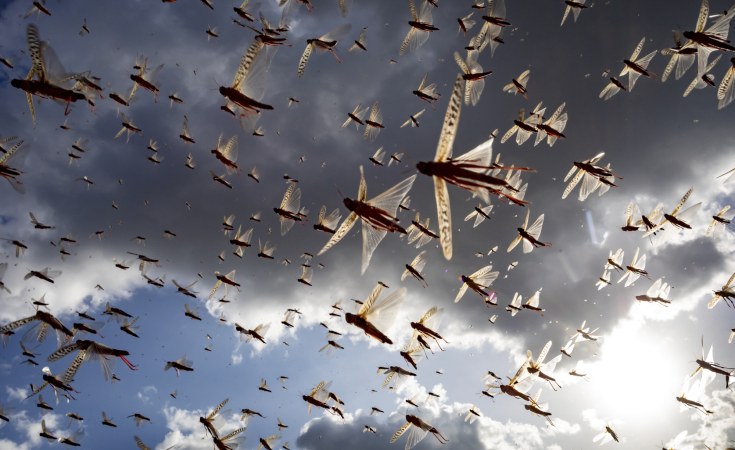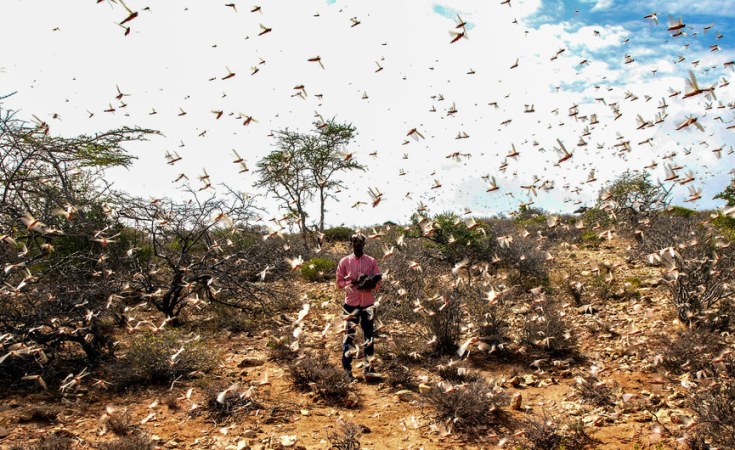
FAO/Sven Torfinn
(file photo).
14 FEBRUARY 2021
The Nation (Nairobi)
By George Munene
The second wave of desert locusts has invaded Embu County, throwing residents into panic.
The voracious insects crossed over to the area from Kitui County and are wreaking havoc on farms in the expansive Mbeere South Constituency.
The most affected villages are Machang'a, Kanthenge, Riachina, Kaburu and Ndunguni where sorghum, millet and green grams are grown in large scale.
The insects were first spotted on Friday evening and are destroying crops, which the residents depend on for survival, at a very high rate.
According to the residents and Mbeere South MP Geoffrey King'ang'i, the insects appear to be very hungry because they were not sparing anything edible.
"They are feeding on crops as well as grass and shrubs. They are dangerous insects," said Mr King'ang'i.
The residents expressed fears that the locusts may wipe out their sorghum, millet and other crops if urgent measures are not taken to eradicate them.
Appeal for intervention
They appealed to the government to intervene quickly before they lose all their crops and pastures for their animals to the locusts which have spread over an area estimated to be 10 square kilometres.
The residents said efforts to chase away the voracious feeders have borne no fruit.
They said if the locusts are not controlled, famine is imminent in the area.
"We may starve if our crops are destroyed and, therefore, we call upon the government to help us eliminate the locusts which are spreading very fast," one of the residents, Mr John Runji, said.
The MP lamented that since the invasion was reported, no government official has visited the area to assess the situation.
"If the locusts are not sprayed, then my people will suffer as they depend on crops to feed and to educate their children," he said.
Mr King'ang'i observed that the locusts have landed in the area even before the residents recover from the adverse effects of the Coronavirus pandemic.
Read the original article on Nation.
Kenya: Swarms of Locusts Invade Mbooni in Makueni County

Haji Dirir/FAO
Locusts swarm (file photo).
1 FEBRUARY 2021
Capital FM (Nairobi)
Makueni — Swarms of locusts have invaded farms in sections of Makueni County Monday.
The locusts were spotted in large areas of Mbooni and Kaiti Constituencies in the County.
Makueni Agriculture County Executive Committee Member Robert Kisyula described the latest invasion as the worst in recent months.
Farmers interviewed expressed fears of the losses they are likely to incur following the invasion on their crops.
"The locusts came through, started to devour the only left crops in our farms," one farmer said, "Some have completely eaten all leaves, leaving only the stems."
Last month, Agriculture Cabinet Secretary Peter Munya said at least 15 counties were affected by the locusts invasion, but assured that efforts were in place to manage the situation.
The government has expressed optimism of eradicating the locusts' menace.
Munya said that 80 percent of the locust swarms that invaded the country during the second wave have so been treated and surveillance was underway to combat the rest.
He said that of the 75 swarms that have been identified, 66 of them have been treated.
Munya further announced that 15 counties were affected including Marsabit, Wajir, Garissa, Tana River, Lamu, Kilifi, Taita Taveta, Mandera, Machakos, Kitui, Isiolo, Samburu, Laikipia, Meru and Tharaka Nithi Counties.
"So far, the total number of swarms that settled in the Country between November 2020 and January 2021 are 75 out of which 66 have been treated reflecting a total area of 19,100 hectares. The exercise has thus largely been successful," Munya said.
Munya pointed out that 9 sprayer aircrafts have been deployed in different Counties which are adversely affected while 500 National Youth Service (NYS) personnel have been trained to help on ground control of the locusts.
"There are sufficient control pesticides both at the headquarters and all the field control bases to handle the desert locust invasion. Where necessary will purchase more," said Munya.
Additionally, 21 vehicles mounted with sprayers for ground control operations in the various bases.
The second wave started last year in November.
In March last year, Kenya and a number of countries in the horn of Africa including Ethiopia, Somalia and Uganda experienced the worst locust attack in seven years.
The first wave affected over 30 counties in Kenya with most of them being the Arid and Semi- Arid ones.
Read the original article on Capital FM.
No comments:
Post a Comment